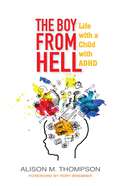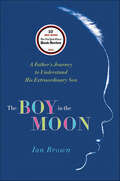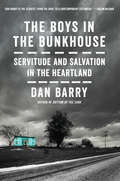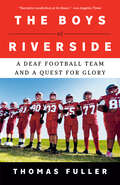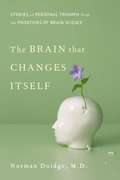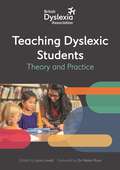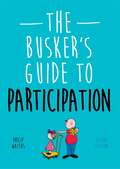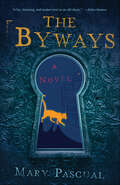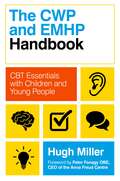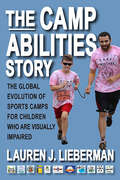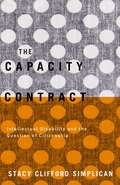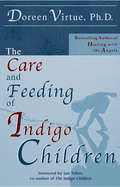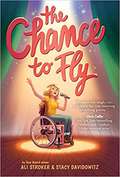- Table View
- List View
The Boy from Baby House 10: From the Nightmare of a Russian Orphanage to a New Life in America
by Alan Philps John LahutskyIn 1990, a young boy afflicted with cerebral palsy was born, prematurely, in Russia. His name was Vanya. His mother abandoned him to the state childcare system and he was sent to a bleak orphanage called Baby House 10. Once there, he entered a nightmare world he was not to leave for more than eight years. Housed in a ward with a group of other children, he was clothed in rags, ignored by most of the staff and given little, if any, medical treatment. He was finally, and cruelly, confined for a time to a mental asylum where he lived, almost caged, lying in a pool of his own waste on a locked ward surrounded by psychotic adults. But, that didn't stop Vanya. Even in these harsh conditions, he grew into a smart and persistent young boy who reached out to everyone around him. Two of those he reached out to—Sarah Philps, the wife of a British journalist, and Vika, a young Russian woman—realized that Vanya was no ordinary child and they began a campaign to find him a home. After many twists and turns, Vanya came to the attention of a single woman living in the United States named Paula Lahutsky. After a lot of red tape and more than one miracle, Paula adopted Vanya and brought him to the U.S. where he is now known as John Lahutsky, an honors student at Freedom High School in Bethlehem, Pennsylvania and a member of the Boy Scouts of America Order of the Arrow. In The Boy From Baby House 10, Sarah's hus band, Alan Philps, helps John Lahutsky bring this inspiring true-life story of a small boy with a big heart and an unquenchable will to readers everywhere.
The Boy from Hell: Life with a Child with ADHD
by Rory Bremner Alison M. ThompsonFor Alison, life with her son Daniel sometimes seemed like an endless round of difficulties: disobedience, backchat, rudeness, name-calling and aggression. Upon starting school, where his aggression and lack of concentration concerned teachers, Daniel was given a vague diagnosis of borderline Attention Deficit Hyperactivity Disorder (ADHD), which was later changed to ADHD with secondary Oppositional Defiant Disorder and autistic traits. In this honest account of the first 18 years of Daniel's life, Alison exposes her own worries, doubts, and exceptional courage at every pivotal turn in Daniel's life. Interspersing the narrative with tips and advice on what she has found useful - or not - in bringing up Daniel, Alison also provides encouraging guidance for teachers and fellow parents. This book also raises serious questions about how the education system supports children with special needs, and if medication can be the answer to managing ADHD in children.
The Boy in the Moon: A Father's Journey to Understand His Extraordinary Son
by Ian Brown“The truth Brown learns from his severely disabled child is a rare one: The life that seems to destroy you is the one you long to embrace.” —New York Times Book ReviewIan Brown’s son Walker is one of only about 300 people worldwide diagnosed with cardiofaciocutaneous (CFC) syndrome—an extremely rare genetic mutation that results in unusual facial appearance, the inability to speak, and a compulsion to hit himself constantly. At age thirteen, he is mentally and developmentally between one and three years old and will need constant care for the rest of his life.Brown travels the globe, meeting with genetic scientists and neurologists as well as parents, to solve the questions Walker’s doctors can’t answer. In his journey, he offers an insightful critique of society’s assumptions about the disabled, and he discovers a connected community of families living with this illness. As Brown gradually lets go of his self-blame and hope for a cure, he learns to accept the Walker he loves, just as he is.Honest, intelligent, and deeply moving, The Boy in the Moon explores the value of a single human life.“Candid . . . heartwrenching. . . . Much more than a moving journal of life with a disabled child; it is about Brown’s quest to understand his son and his son’s condition . . . An absorbing, revealing work of startling frankness.” —Kirkus Reviews“Unforgettable . . . Crisp, observant and, occasionally, subversively funny.” —Cleveland Plain Dealer”Honest and deeply moving.” —Tucson Citizen“[A] beautiful book, heartfelt and profound, warm and wise.” —Jane Bernstein, author of Loving Rachel and Rachel in the World
The Boys in the Bunkhouse: Servitude and Salvation in the Heartland
by Dan BarryA Dickensian tale from America’s heartland,New York Times columnist Dan Barry’s The Boys in the Bunkhouse is a luminous work of social justice. Told with compassion and compelling detail, this is the harrowing yet uplifting story of the exploitation and abuse of a resilient group of men with intellectual disability, and the heroic efforts of those who helped them to find justice and reclaim their lives.In the tiny Iowa farm town of Atalissa, dozens of men, all with intellectual disability and all from Texas, lived in an old schoolhouse. Before dawn each morning, they were bussed to a nearby processing plant, where they eviscerated turkeys in return for food, lodging, and $65 a month. They lived in near servitude for more than thirty years, enduring increasing neglect, exploitation, and physical and emotional abuse—until state social workers, local journalists, and one tenacious labor lawyer helped these men achieve freedom.Drawing on exhaustive interviews, Dan Barry dives deeply into the lives of the men, recording their memories of suffering, loneliness and fleeting joy, as well as the undying hope they maintained despite their traumatic circumstances. Barry explores how a small Iowa town remained oblivious to the plight of these men, analyzes the many causes for such profound and chronic negligence, and lays out the impact of the men’s dramatic court case, which has spurred advocates—including President Obama—to push for just pay and improved working conditions for people living with disabilities.The Boys in the Bunkhouse is more than just inspired storytelling. It is a clarion call for a vigilance that ensures inclusion and dignity for all.
The Boys of Riverside: A Deaf Football Team and a Quest for Glory
by Thomas FullerNAMED A BEST BOOK BY BOOK RIOT, AND MORE! • The incredible story of an all-deaf high school football team&’s triumphant climb from underdog to undefeated, their inspirational brotherhood, a fascinating portrait of deafness in America, and the indefatigable head coach who spearheaded the team, by New York Times reporter and Page One Correspondent, Thomas Fuller."The Boys of Riverside is another example of how anyone can achieve their dreams, making what appears impossible, possible.&” —Marlee Matlin, Academy Award winner"Remarkable"—Wall Street Journal • "Narrative nonfiction at its finest, filled with drama, detail and action."—Los Angeles Times • "Inspiring." —Parade.comIn November 2021, an obscure email from the California Department of Education landed in New York Times reporter, Thomas Fuller&’s, inbox. The football team at the California School for the Deaf in Riverside, a state-run school with only 168 high school students, was having an undefeated season. After years of covering war, wildfires, pandemic, and mass shootings, Fuller was captivated by the story of this group of high school boys. It was uplifting. During the gloom of the pandemic, it was a happy story. It was a sports story but not an ordinary one, built on the chemistry between a group of underestimated boys and their superhero advocate coach, Keith Adams, a deaf former athlete himself. The team, and Adams, tackled the many stereotypes and seemed to be succeeding. Fuller packed his bags and drove seven hours to the Riverside campus.The Boys of Riverside looks back at the historic 2021 and 2022 seasons in which the California School for the Deaf chased history. It follows the personal journeys of their dynamic deaf head coach, and a student who spent the majority of the season sleeping in his father&’s car in the Target parking lot. It tells the story of a fiercely committed player who literally played through a broken leg in order not to miss a crucial game, as well as myriad other heart-wrenching and uplifting narratives of players who found common purpose. Through their eyes, Fuller reveals a portrait of high school athletics, inspiring camaraderie, and deafness in America.
The Brain That Changes Itself: Stories of Personal Triumph from the Frontiers of Brain Science
by Norman DoidgeAn astonishing new science called neuroplasticity is overthrowing the centuries-old notion that the human brain is immutable, by psychiatrist and psychoanalyst, Norman Doidge, M.D., traveled the country to meet both the brilliant scientists championing neuroplasticity and the people whose lives they've transformed-people whose mental limitations or brain damage were seen as unalterable. We see a woman born with half a brain that rewired itself to work as a whole, blind people who learn to see, learning disorders cured, IQs raised, aging brains rejuvenated, stroke patients learning to speak, children with cerebral palsy learning to move with more grace, depression and anxiety disorders successfully treated, and lifelong character traits changed. Using these marvelous stories to probe mysteries of the body, emotion, love, sex, culture, and education, Dr. Doidge has written an immensely moving, inspiring book that will permanently alter the way we look at our brains, human nature, and human potential.
The Brave
by James BirdPerfect for fans of Rain Reign, this middle-grade novel The Brave is about a boy with an OCD issue and his move to a reservation to live with his biological mother. <P><P>Collin can't help himself—he has a unique condition that finds him counting every letter spoken to him. It's a quirk that makes him a prime target for bullies, and a continual frustration to the adults around him, including his father. When Collin asked to leave yet another school, his dad decides to send him to live in Minnesota with the mother he's never met. She is Ojibwe, and lives on a reservation. Collin arrives in Duluth with his loyal dog, Seven, and quickly finds his mom and his new home to be warm, welcoming, and accepting of his condition. <P><P>Collin’s quirk is matched by that of his neighbor, Orenda, a girl who lives mostly in her treehouse and believes she is turning into a butterfly. With Orenda’s help, Collin works hard to overcome his challenges. His real test comes when he must step up for his new friend and trust his new family.
The British Dyslexia Association - Teaching Dyslexic Students: Theory and Practice
by British Dyslexia AssociationThis BDA developed guide assists you in supporting children and students with dyslexia and specific learning difficulties through their education. Designed specifically for candidates on Level 5 diploma courses in dyslexia and specific learning difficulties, this hands-on guide is the perfect training companion for those wanting to know more about dyslexia and how to support individuals with dyslexia.As an authoritative, entry-level resource covering both theory and practice, the methods, resources, and expert contributors in this book empower your learning as an educator towards better self-understanding, confidence and how to better support students in specialist and classroom settings.
The Brothers Story
by Katherine SturtevantIn the late seventeenth century, fifteen-year-old Kit, driven to desperation by the starvation of one brother and mistreatment of his own simple-minded twin, realizes his dream of becoming an apprentice in London but feels drawn by duty to return home to Essex.
The Bullet Meant for Me
by Jan ReidOn April 20, 1998, Jan Reid was shot during a robbery in Mexico City, where he had gone to watch his friend, the boxer Jesus Chavez, fight. In The Bullet Meant for Me, Reid powerfully recounts his ordeal, the long chain of life events that brought him to that fateful attack, and his struggle to regain the ability to walk and to be a full partner in a deeply satisfying marriage. Re-examining the whole trajectory of his life, Reid questions how much the Texan ideal of manhood shaped his identity, including his love for boxing and participation in the sport. He meditates on male friendship as he tells the story of his close relationship with Chavez, whose career and personal travails Reid details with empathy and insight. And he describes his long months in physical therapy, during which he drew on the unwavering love of his wife and daughter, as well as the courage and strength he had learned from boxing, to heal his body and spirit. A moving, intimate portrait of a man, a friendship, and a marriage, The Bullet Meant for Me is Jan Reid's most personal book.
The Busker's Guide to Participation, Second Edition
by Chris Bennett Philip Waters"Participation? Of course we do - every Wednesday without fail..." · What is participation? · What's the difference between 'adult-led' and 'child-led' participation? · And do we really need to do it at all? This second edition of The Busker's Guide to Participation sets out to help us understand our values and reasons for undertaking participation with children and young people. It shows us what authentic participation really looks like, helping us to get to grips with the ways we can positively support, interact, engage, include, involve and communicate with children and young people on all levels. Learn how to move away from simply 'doing' participation for participation's sake, and start to see participation as a 'way of being' for the benefit of everyone involved.
The Butterfly's Dance
by Christyna HunterAfter giving up the dream of her youth, Kayla Jennings is now given an opportunity to embrace it again. The only obstacle is the man who has healed her heart and soul. Kayla lost the use of her legs, as well as her belief in dreams, when she was in a tragic automobile accident at the age of 12. Jordan Michaels had plans to explore the world until family duties required him to stay home. Eighteen years later, Jordan and Kayla meet when he brings his ill nephew to her for help. And together they help to heal the pain from each other's pasts. But Kayla learns there may be a way for her to get back the use of her legs. The only cost would be giving up the love she thought she'd never find.
The Byways: A Novel
by Mary PascualNeurodivergent high school student CeeCee Harper has a temper and a reputation for trouble. Angry at the rumors and afraid she’ll never fit in, she makes a wrong move—and lands in the byways, a world of alleys, magic, and forgotten people . . . some that aren’t even human. And if she doesn’t escape quickly, CeeCee learns, she’ll be trapped for good. Searching for a way out, she gets lost among monsters, drug pushers, the homeless, and political upheaval, and soon finds there are those who will stop at nothing to keep her from leaving. But the byways pull people in for a reason. CeeCee must figure out why she got stuck in the first place—before her loved ones are put in danger and she loses them forever. A dark retelling of Alice in Wonderland meets Howl’s Moving Castle, this contemporary fantasy will enchant Diana Wynne Jones and Christina Henry fans.
The CWP and EMHP Handbook: CBT Essentials with Children and Young People
by Hugh MillerAs an Education Mental Health Practitioner (EMHP) or Children's Wellbeing Practitioner (CWP), you have to think on your feet, manage a caseload, deal with emotional distress and try and not get indigestion as you cram down a sandwich on your way to your next session.This down-to-earth survival guide helps trainees and newly qualified practitioners cope with the stressful demands of these new and challenging roles. Full of case examples and practical tools and strategies, this book will give you the confidence to assess, set goals, and deliver effective interventions for anxiety and depression. It also provides invaluable support on tricky topics such as disclosures of risk and safeguarding issues, working effectively with parents, dealing with resistance and conflict, caring for yourself, and signposting when a situation is outside the remit of your role.
The Camp Abilities Story: The Global Evolution of Sports Camps for Children Who Are Visually Impaired (Excelsior Editions)
by Lauren J. LiebermanIn 1995, Lauren Lieberman was an assistant professor with a dream: to form an educational sports camp for children who are visually impaired. Beginning with a small grant, Lieberman built a local program that grew into a worldwide movement. The Camp Abilities model has now been replicated all over the United States and in ten other countries. The Camp Abilities Story relates Lieberman's journey—from her earliest experiences in sports, to her "aha moment" during college, to her Fulbright scholarship and starting Camp Abilities programs worldwide. With an inspirational yet honest view of how a dream to make a difference in the world was tempered by the reality of the hard work necessary to change lives, the lessons herein are applicable to anyone with a dream to make the world a better place.
The Capacity Contract: Intellectual Disability and the Question of Citizenship
by Stacy Clifford SimplicanIn the first sustained examination of disability through the lens of political theory, The Capacity Contract shows how the exclusion of disabled people has shaped democratic politics. Stacy Clifford Simplican demonstrates how disability buttresses systems of domination based on race, sex, and gender. She exposes how democratic theory and politics have long blocked from political citizenship anyone whose cognitive capacity falls below a threshold level⎯marginalization with real-world repercussions on the implementation of disability rights today. Simplican&’s compelling ethnographic analysis of the self-advocacy movement describes the obstacles it faces. From the outside, the movement must confront stiff budget cuts and dwindling memberships; internally, self-advocates must find ways to demand political standing without reinforcing entrenched stigma against people with profound cognitive disabilities. And yet Simplican&’s investigation also offers democratic theorists and disability activists a more emancipatory vision of democracy as it relates to disability⎯one that focuses on enabling people to engage in public and spontaneous action to disrupt exclusion and stigma. Taking seriously democratic promises of equality and inclusion, The Capacity Contract rejects conceptions of political citizenship that privilege cognitive capacity and, instead, centers such citizenship on action that is accessible to all people.
The Car, The Sled, and The Butch Wax
by Marc MaurerIn this book, successful people (who happen to be blind) tell stories which illustrate coping strategies while amusing the reader. Young adults will find courage in these true sharings. Can a person who is blind really do almost anything by using alternate techniques? What are those techniques? These eight people share a few of them. When a student teacher is faced with schoolchildren who have a sledding day planned, will a white cane be enough? Can a man without sight possibly rebuild a car's engine? When a young girl tests butch wax on her long tresses, does her hair ever return to its normal state? Whose fault is it when a person who is blind opens a taxicab door onto the side of a shiny, new SUV? These experiences delight, challenge and inform. This file should make an excellent embossed braille copy.
The Care and Feeding of Indigo Children
by Doreen VirtueIndigo Children are bright, intuitive, strong-willed, and sometimes self-destructive individuals. They are often labeled (and misdiagnosed) as having ADD or ADHD because they won't comply with established rules and patterns; and they may exhibit behavioral problems at home and at school. In The Care and Feeding of Indigo Children, Doreen Virtue explores the psyche of these special kids and offers alternative solutions to Ritalin based on her extensive research and interviews with child-care experts, teachers, parents, and the Indigo Children themselves. Read the accounts of these remarkable young people as they explain why they act-out, are aggressive or withdrawn; and what they want from the adults in their lives. You'll also be fascinated by the psychic experiences that these kids have had in their lives so far. This is a groundbreaking book that can positively affect the ways in which you interact with your children, altering the shape of their future in miraculous ways.
The Case of the Crooked Campaign (Romeo Riley, Private Eye #2)
by April M. WhittRomeo was born with cerebral palsy. His CP affects his speech and mobility. It does not, however, affect his ability to solve mysteries! He stays on the go in his power wheelchair, and speaks with an electronic communication device. But there are no limits to the trouble he gets into!
The Caterpillar's Question
by Piers Anthony Philip Jose FarmerTappy was thirteen, blind, crippled and mute. Jack was hired to drive her across the country to a place where they were supposed to help her, but Jack wondered. They said she could speak if she wanted to badly enough, that the condition was hysterical. As they drove, he found himself liking the young girl and becoming more and more intrigued with her behavior. Why did she want to stop and walk around in the middle of nowhere. Perhaps Jack would regret his wanting to know when they both disappeared somewhere ... else?
The Center Can Not Hold: My Journey Through Madness
by Elyn R. SaksSaks was only eight, and living an otherwise idyllic childhood in sunny 1960s Miami, when her first symptoms appeared in the form of obsessions and night terrors. But it was not until she reached Oxford University as a Marshall Scholar that her first full-blown episode, complete with voices in her head and terrifying suicidal fantasies, forced her into a psychiatric hospital. Saks would later attend Yale Law School where one night, during her first term, she had a breakdown that left her singing on the roof of the law school library at midnight. She was taken to the emergency room, force-fed antipsychotic medication, and tied hand-and-foot to the cold metal of a hospital bed. She spent the next five months in a psychiatric ward. So began Saks's long war with her own internal demons and the equally powerful forces of stigma. Today she is a chaired professor of law who researches and writes about the rights of the mentally ill. She is married to a wonderful man. In The Center Cannot Hold, Elyn Saks discusses frankly and movingly the paranoia, the inability to tell imaginary fears from real ones, and the voices in her head insisting she do terrible things, as well as the many obstacles she overcame to become the woman she is today. It is destined to become a classic in the genre.
The Ceres Solution
by Bob ShawDenny Hargate, wheelchair-bound and embittered, has his life changed when he meets a beautiful woman in an out-of-the-way place called Cotter's Edge.
The Chairman
by Harry Krausfrom the book cover.... Something is wrong in Fisher's Retreat. And Police officer Nathan McAllister is caught in the middle without a clue how he got there....he knows one thing for certain. His life will never be the same. He no longer has a job. His wife Abby has become distant and uncaring. And his entire world now revolves around the one question he can not answer: What really happened that fateful day in Fisher's Retreat? The official police report states that a drug bust went awry, but he doubts that is the truth. As Nathan's suspicions grow about that day in Fisher's Retreat, so does his need for the truth. But he has been warned to stop asking questions. Someone doesn't want him to learn what really happened. But The Greater mystery for Nathan is what happened to his marriage. Can Abby love Nathan now? His body no longer works. He needs to be cared for as an infant. Yet, as Abby learns to face Nathan's physical difficulties, she begins to see a side of Nathan that hadn't existed before. A new creation has been born in a broken body.. But just when she feels the love rekindle, Nathan begins to push her away, afraid. Is it too late for both of them?
The Challenge of Epilepsy: Take Control of Your Seizures-and Your Life-through Complementary and Alternative Solutions
by Sally FletcherDescribes alternative methods of controlling epilepsy
The Chance to Fly
by Ali StrokerA heartfelt middle-grade novel about a theater-loving girl who uses a wheelchair for mobility and her quest to defy expectations—and gravity—from Tony award–winning actress Ali Stroker and Stacy Davidowitz <p><p> Thirteen-year-old Nat Beacon loves a lot of things: her dog Warbucks, her best friend Chloe, and competing on her wheelchair racing team, the Zoomers, to name a few. But there’s one thing she’s absolutely OBSESSED with: MUSICALS! From Hamilton to Les Mis, there’s not a cast album she hasn’t memorized and belted along to. She’s never actually been in a musical though, or even seen an actor who uses a wheelchair for mobility on stage. Would someone like Nat ever get cast? <p><p> But when Nat’s family moves from California to New Jersey, Nat stumbles upon auditions for a kids’ production of Wicked, one of her favorite musicals ever! And she gets into the ensemble! The other cast members are super cool and inclusive (well, most of them)— especially Malik, the male lead and cutest boy Nat’s ever seen. But when things go awry a week before opening night, will Nat be able to cast her fears and insecurities aside and “Defy Gravity” in every sense of the song title?

